
The symposium on “Economies of China and Japan and the Future of the World” was successfully held in the Conference Hall on the first floor of the Architectural Design and Research Institute of Tongji University on May 21, 2019. Mr. Shi Jun, Vice Chairman of the Economic Committee of the 12th National Committee of the CPPCC, former Vice Governor and member of the Standing Committee of Gansu Provincial Party Committee, and an adjunct professor of Tongji University, Mr. Seguchi Kiyoyuki, Research Director of the Canon Institute for Global Studies (CIGS), and Mr. Zhou Tianyong, a professor at the Party School of the Central Committee of the CPC and a visiting fellow at the Institute for Advanced Studies in Humanities and Social Science of Tongji University, delivered speeches. Prof. Jiang Bo, Vice President of Tongji University, Ms. Wu Junhua, Research Director of the Japan Research Institute, and Ms. Okazaki Kumiko, Research Director of CIGS, participated in related activities. The event was moderated by Tongji Distinguished Professor Men Honghua,President of the Institute for China & World Studies and Dean of the School of Political Science & International Relations, Tongji University.
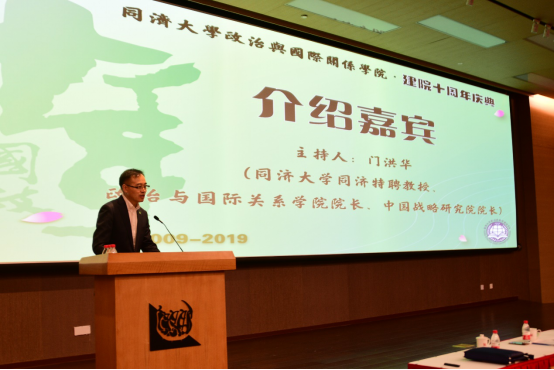
Director Shi Jun analyzed how China can achieve economic integration and development by telling three stories. The first one is about Mr. Guo Guangchang, Chairman of Shanghai-based Fosun Group, who raised the question of how to promote integrative development of the economy based on the principle of administrative centrality. With regard to Guo’s doubt on the role of state-owned enterprises (SOEs) and private enterprises in the mixed-ownership reform, Director Shi believed that there are three major obstacles to the promotion of mixed-ownership reform by SOEs: there are concerns about the loss of state-owned assets; there are one organization, two identities, and two distribution mechanisms in SOEs; and SOEs and private enterprises have different views on the proportion of shareholding in the merged organization. As such, Director Shi proposed to implement the neutral competition principle, and the key path is combination, integration and harmonization. The most important thing is to build a sound corporate development model and explore an industry-financing model with Chinese characteristics. The second one is about Ms. Wang Lihong who is exploring integrative development driven by technology. Wang’s team has built experimental bases dedicated to degradable plastics in 24 provinces in China, but they find it difficult to promote on a large scale. Director Shi believed that this is because China’s reform and opening up is still inadequate, and the decisive role of market in allocating resources has not been fully played. The last one is about Prof. Luo Yongzhang. The tumor marker discovered by Luo’s team has been certified by the European Union, but they have not obtained certification in China after 2-3 years’ application. They asked three questions: Why did the EU approve so quickly? Why haven’t they got approved in China although they filed long before? Why can’t China be in line with developed countries in terms of economic rules? Director Shi said that these questions point directly at China’s business environment and other major issues that affect its economic development. To establish a modern economic system and to promote high-quality economic development, China must internationalize its business environment.
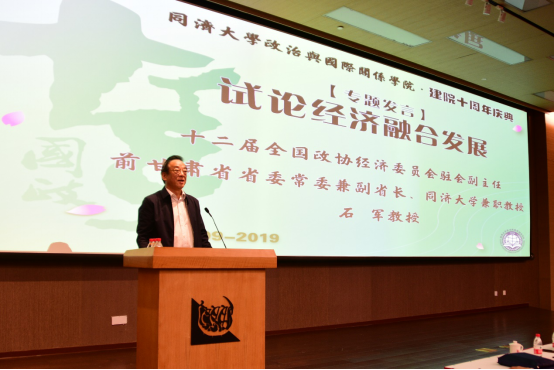
Director Shi concluded that it would be a good thing to see Chinese trains running on foreign tracks, and vice versa. Ideally, trains of different countries will be running all over the world. Only in this way can we promote integrative development, accelerate the Belt and Road cooperation, and eventually build a global community of shared future.
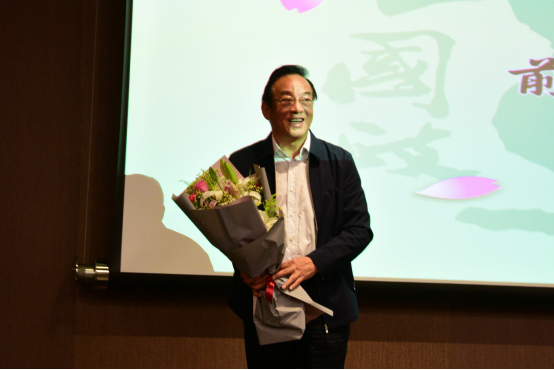
After the wonderful speech by Director Shi, Prof. Zhou Tianyong analyzed China’s income issue and pointed out that due to the China-US trade friction, China is making major adjustments to its development strategy. In the past, China adopted an export-oriented industrialization strategy which combined cheap intensive labor and land resources with foreign equipment and capital for large-scale production to stimulate economic growth through exports. But the international economic situation that used to be favorable to this strategy is undergoing sudden changes. Major countries like the United States, France and Germany have proposed “re-industrialization” that will restrict the export of Chinese products; and developing countries are copying China’s development model, resulting in the transfer of Chinese domestic industries to Vietnam, Indonesia, Malaysia, India and other countries. At the same time, the outbreak of the China-US trade war has caused outflow of some industries. All these indicate that China’s export-oriented development strategy doesn’t work.
In Prof. Zhou’s view, China has encountered problems with its strategy of using investment to stimulate economic growth. Specifically, machines are replacing humans in infrastructure construction, resulting in a significant drop in the investment-to-wage ratio, so it is impossible to stimulate consumption in this way; local governments are burdened by the deficit-to-GDP ratio; young people have strong consumption needs, but the elderly are barely interested in buying things. The supply-side reform (cut overcapacity, reduce excess inventory, deleverage, lower costs) aimed at solving these problems is contrary to the market logic because it wants to cut overcapacity by administrative means. He pointed out that the key is to increase residents’ income and expand demand of consumers with spending power. China’s future strategy and policy trend is to abandon the urbanization of buildings and urban areas and promote citizenization; continue industrialization; vigorously increase the income level of low-income residents, and abandon the mindset of simultaneous growth of labor wages, resident income and GDP. Prof. Zhou urged that China must squeeze the GDP bubble from the economic structure. The key is to increase income, promote urbanization, promote industrialization, increase farmers' income, buy industrial products, and expand domestic consumer demand to sustain economic growth.

Then, Mr. Seguchi Kiyoyuki gave a speech on the topic of “Prospects of China-Japan Relations amid China-US Frictions”. Mr. Seguchi pointed out that China has posed a threat to the United States in economic and military terms. If China-US relations continue to deteriorate, the US will risk losing the China market that is open and attractive. This will limit the US sanctions on China to some extent. Therefore, he believed that the Chinese government should give priority to domestic reform and coordination with the US, and that China should choose to join the TPP. Mr. Seguchi predicted that the Chinese economy will grow steadily until the 2020s, so China should leverage this opportunity to promote reform. This year, the Chinese government is required to address the uncertainties caused by the trade frictions with the US, promote reform and maintain a stable macro economy. When talking about China-Japan economic relations, he emphasized the positive role of non-governmental exchanges in promoting the bilateral relations and the importance of China to Japanese companies. He has faith in an improving trend in China-Japan relations.
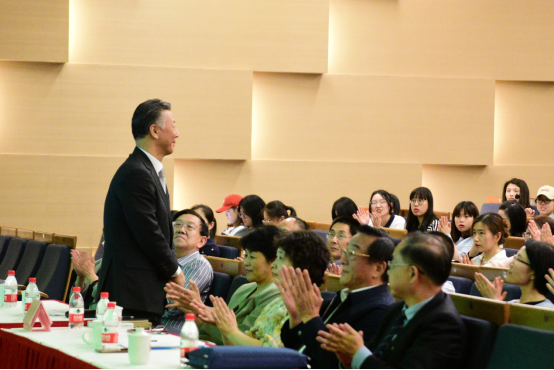
In Mr. Seguchi’s opinion, the world has noticed the chronic decline in the US leadership, but there is no country that is able to replace the US. The world order is yet to stabilize, and the risk of a shaky world order will increase in the future. In this regard, the concepts advocated by Japanese companies, including social contribution, long-term benefits, resource security, happiness and self-realization, can alleviate the adverse effects of anti-establishment camp; the inclusiveness principle upheld by the ancient Chinese book Lao Zi can help promote consensus between governments in the world; the governance spirit in Japanese traditional culture and the concept in China’s The Book of Historical Documents (Shang Shu) can help control terrorism and social division. Finally, Mr. Seguchi emphasized that China’s development and Japan’s development are indispensable from each other, so it’s vital to maintain good bilateral relations.
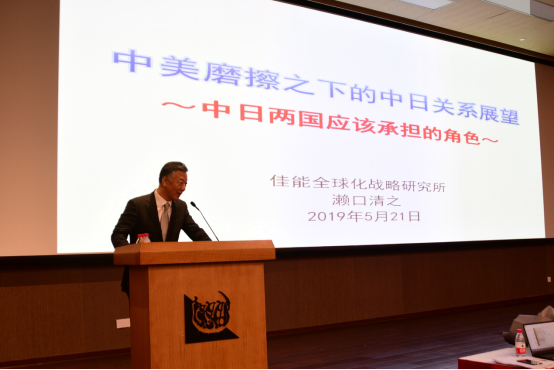
Dean Men then thanked all the experts for their insights. Director Shi’s thinking on the integrative development of China’s economy, Prof. Zhou’s discussion on how to increase resident income and expand consumer demand, and Mr. Seguchi’s analysis of China-Japan economic relations and the future of the world are deep understanding and good suggestions for building a community of shared future, reflecting profound humanistic sentiments.
Director Shi thought deeply about the challenges to China’s development. Based on the open economic theory and his rich experience on multiple public posts over the years, he is able to see clearly the inherent difficulties facing China’s economic development, and propose solutions with top-level design and practical significance. Director Shi has had a lot of in-depth thinking about the greatest changes unseen in a century proposed by the General Secretary, and monitored the issues related to overall coordination of both the domestic and international situations, based on which he has proposed the general idea of solving China’s economic problems through international cooperation and overall opening.
Prof. Zhou’s speech is a typical case that closely combines the domestic and international situations. He put forward his own insights on what results China can achieve in the world. Prof. Zhou’s research has two characteristics: he usually explores major issues that are relatable to the public, such as population issue and unapproved construction projects; and he is an influencer on Weibo posting lots of sensational content. Of course, his constructive criticism is very helpful. Many of his suggestions are watched and accepted by the leadership, and even provide guidance for policymaking. He points out that as the era of export-driven economic growth has ended and the strategy of export-oriented industrialization ceases to work, the government should focus its strategy on expanding domestic consumer demand and doubling resident income to pursue integrative development.
Mr. Seguchi’s speech focused on the possible closer economic relations between China and Japan, and he proposed a path for the two countries to jointly contribute to the world economy. The idea of China-Japan coordination has been put into practice. We should thank him for his efforts to promote China-Japan academic exchanges!
Dean Men said that we are impressed by their true feelings, their love for their country and for the world, their efforts to maintaining friendly relations with each other, and their strong support for our school. Director Shi’s 48-minute speech, Prof. Zhou’s 50-minute speech, and Mr. Seguchi’s 52-minute speech pushed today’s event to a climax step by step. Dean Men said wittily, “Today is May 21. My daughter sent me a message saying that I should show my love to her by sending her a red packet, until then had I realized that today is the ‘day of confession’. I’d like to thank the three experts for their wonderful speeches and their support for Tongji. This is a gift package! I sincerely welcome them to come again and often. This is our invitation and gift package! Let us give them a big round of applause to express our thanks!”
Dean Men finally pointed out that the theme activities celebrating the 10th anniversary of our school have come to an end with the successful holding of today’s event. He thanked the faculty members and students for their support and help. These activities show the achievements, efforts and persistence of the school. Let us wish our school a better future with warm applause!






